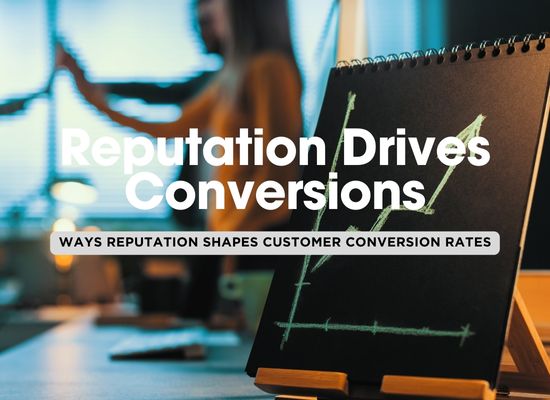Your business’s reputation isn’t just about how people perceive you—it directly affects how likely they are to become your customers. In today’s digital age, potential customers often make decisions based on reviews, social proof, and your online presence. Reputation management plays a crucial role in building trust, shaping customer perceptions, and ultimately boosting conversion rates. Here are five key ways reputation management can transform your conversion rates, starting with the first three.
1. Builds Trust Through Positive Reviews ⭐🛍️
Online reviews are often the first thing potential customers check before making a purchase or hiring a service. A strong collection of positive reviews can instantly establish trust and encourage conversions.
- How It Impacts Conversion Rates:
- Customers are more likely to buy from businesses with numerous positive reviews and high ratings.
- According to research, 93% of consumers say online reviews influence their purchase decisions.
- How to Manage This:
- Encourage Reviews: Ask satisfied customers to leave reviews on platforms like Google, Yelp, or Trustpilot.
- Respond to Reviews: Thank customers for positive feedback and address negative reviews professionally to show you care about customer experiences.
- Pro Tip: Display top reviews prominently on your website and marketing materials to reinforce trust and influence buying decisions.
2. Improves Credibility with Social Proof 🫶📣
Social proof, such as testimonials, case studies, and user-generated content, is a powerful way to show potential customers that others trust and value your business.
- How It Impacts Conversion Rates:
- Seeing others’ positive experiences reduces hesitation and boosts confidence in your brand, leading to higher conversions.
- Testimonials and case studies can explain how your product or service solves real problems, helping potential customers envision similar success.
- How to Manage This:
- Collect testimonials from happy customers and highlight them on your website, especially near calls-to-action.
- Encourage user-generated content, like photos or videos of customers using your product, and share it on social media.
- Pro Tip: Add a live review feed or “Recently Purchased” notifications to your website to showcase ongoing social proof.
3. Enhances Visibility and SEO Rankings 🔍📈
Reputation management affects how often potential customers find your business online, especially through search engines. A well-maintained online reputation improves your search visibility and drives organic traffic.
- How It Impacts Conversion Rates:
- Higher search rankings mean more people find your website, increasing the chances of conversions.
- Positive reviews and mentions boost your SEO by signaling to search engines that your business is trustworthy and relevant.
- How to Manage This:
- Optimize Listings: Ensure your business information is accurate and consistent across directories like Google My Business, Bing Places, and Yelp.
- Encourage Fresh Reviews: Frequent, recent reviews keep your business active in search engine algorithms.
- Engage with Mentions: Respond to mentions of your brand online, including social media and blogs, to strengthen your online presence.
- Pro Tip: Use tools like Google Alerts or reputation management software to track your business’s online mentions and address issues promptly.
4. Reduces Abandoned Purchases 🛒❌
Reputation management can significantly impact whether customers follow through with a purchase or abandon their cart. Concerns about a business’s reliability often arise during the decision-making process, and a strong reputation can ease those doubts.
- How It Impacts Conversion Rates:
- A business with a solid reputation and glowing reviews reassures customers that their purchase will meet expectations, reducing hesitation.
- Addressing negative feedback effectively can turn skeptics into buyers by showing that you value customer satisfaction.
- How to Manage This:
- Highlight customer service excellence in your reviews and on your website to build confidence.
- Display trust signals like secure payment icons, return policies, and customer support contact information during the checkout process.
- Pro Tip: Follow up on abandoned carts with personalized emails that include reviews or testimonials, reinforcing trust and encouraging customers to complete their purchase.
5. Builds Long-Term Customer Loyalty 🤝💖
A well-managed reputation not only attracts new customers but also retains existing ones, turning one-time buyers into loyal advocates. This loyalty significantly boosts lifetime value and creates a steady stream of conversions through repeat purchases and referrals.
- How It Impacts Conversion Rates:
- Loyal customers are more likely to leave positive reviews, recommend your business to others, and become repeat buyers.
- Word-of-mouth and referrals from satisfied customers can drive conversions at little to no additional marketing cost.
- How to Manage This:
- Engage with loyal customers through personalized messages, loyalty programs, or exclusive offers.
- Use feedback from repeat customers to improve your services and strengthen relationships.
- Pro Tip: Encourage happy customers to refer friends or family by offering incentives like discounts or freebies, creating a win-win situation for both parties.
Build Trust, Drive Conversions 🌟📊
Reputation management isn’t just about controlling what people say about your business—it’s about creating trust, boosting credibility, and driving long-term success. By focusing on key elements like positive reviews, social proof, and SEO, you can significantly enhance your conversion rates while building a loyal customer base. Start small, whether it’s responding to reviews or optimizing your online presence, and watch as your business’s reputation becomes a powerful tool for growth.



